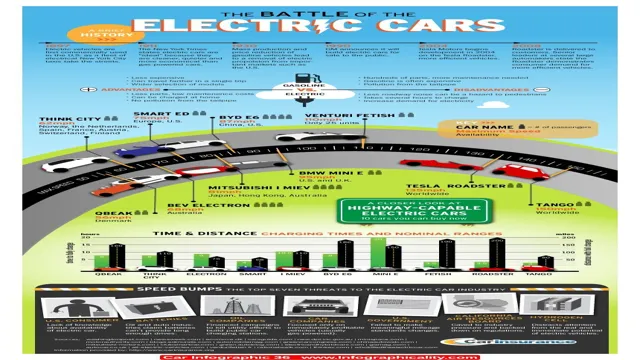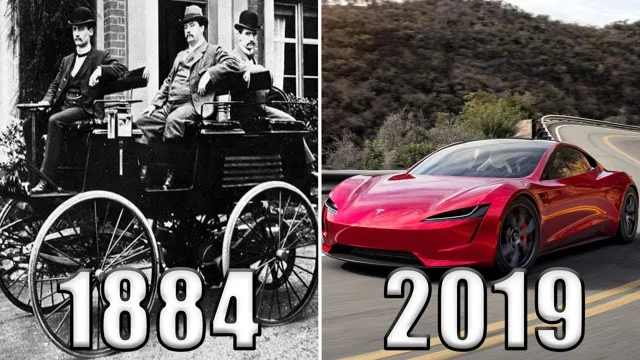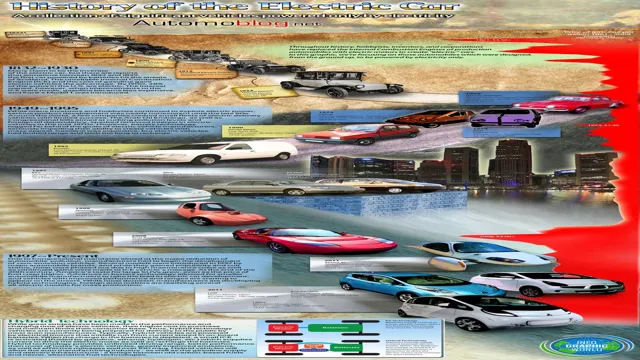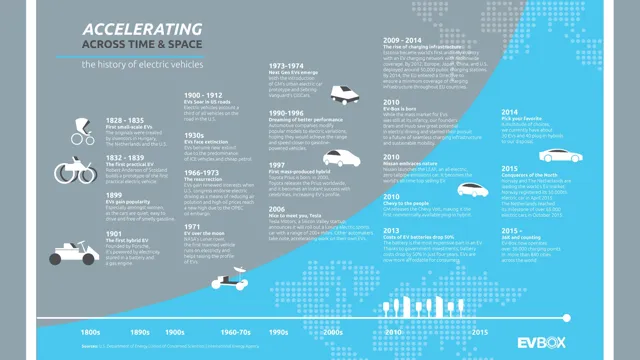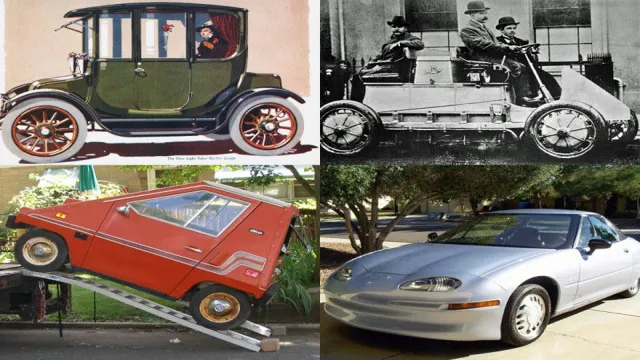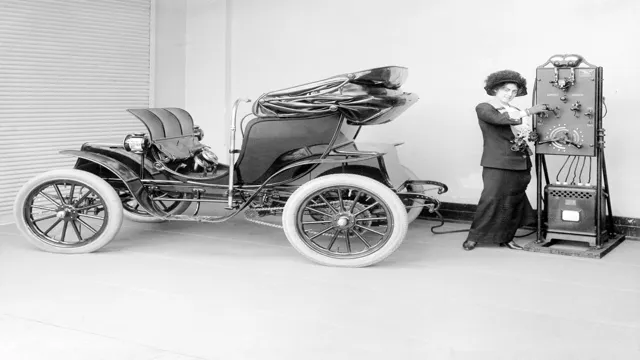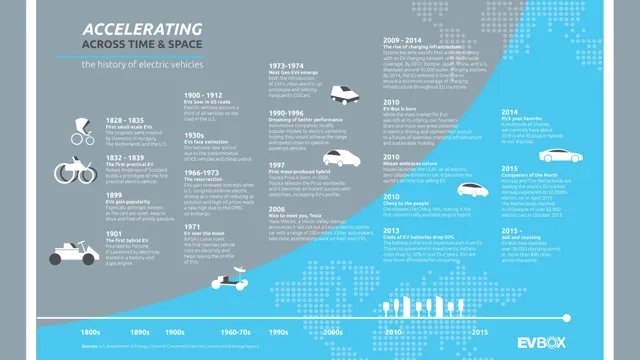A Shocking History: How Electrical Cars Transformed the Automotive Industry
Have you ever wondered about the history of electric cars? As fossil fuels continue to become scarce resources, more and more people are turning to alternative forms of transportation. Electric cars seem to be a modern invention, but did you know that their history dates back to the mid-19th century? The first electric car was developed in 1837 by a chemist named Robert Davidson. It could reach a top speed of 4 miles per hour and was powered by galvanic cells.
Over the next few decades, inventors improved upon the technology and made electric cars more practical. By the early 1900s, electric cars were a common sight on the streets of major cities. However, the invention of the gasoline-powered engine changed everything.
Gasoline cars were cheaper to produce, could travel longer distances, and could be refueled much faster than electric cars. As a result, electric cars fell out of favor and were seen as impractical. It wasn’t until the 1990s that electric cars made a comeback.
Advances in battery technology and the need to reduce emissions led to a renewed interest in electric vehicles. Today, electric cars are becoming more and more popular, with major car manufacturers such as Tesla, Nissan, and Chevrolet producing their own electric models. The history of electric cars is a fascinating one, filled with inventions, innovations, and setbacks.
In this blog, we’ll take a closer look at the evolution of electric cars and how they’ve changed over the years. Join us as we explore the past, present, and future of electric cars.
Early Days of Electric Cars
Electric cars are a relatively new phenomenon, with the first practical electric car being invented in the 1890s. At the time, electric cars were seen as a symbol of luxury, with their quiet and efficient operation making them popular with the upper classes. However, as gasoline-powered cars became more affordable and widespread, electric cars fell out of favor and were largely forgotten about.
It wasn’t until the 1970s oil crisis that electric cars began to make a comeback, with manufacturers like General Motors and Ford experimenting with electric vehicles as a way of reducing their dependence on foreign oil. Despite some early successes, electric cars proved to be technologically challenging, and the high cost of batteries meant that they were not seen as a viable alternative to gasoline-powered cars. In recent years, however, advances in technology have once again brought electric cars to the forefront of the automotive industry, with major manufacturers investing heavily in electric vehicle technology and governments around the world offering incentives to encourage consumers to switch to electric cars.
As a result, today’s electric cars are efficient, affordable, and increasingly popular with consumers.
1830s-1880s: Genesis
The early days of electric cars date back to the 1830s when the first electric vehicle was invented. At the time, these vehicles were considered a luxury item and were only affordable and accessible to the wealthy. However, by the 1880s, technological advancements had lowered the cost of electric vehicles, making them more widely available and popular amongst the general public.
During this time, electric vehicles were used primarily for short-distance travel, such as within cities, due to their limited battery capacity. However, they were gradually becoming a viable alternative to gas-powered cars as they were more reliable, quieter, and produced no emissions. The first electric car, invented by Robert Anderson in Scotland, used a battery that consisted of cells filled with chemicals that generated electricity.
Although it had a limited range, it was a significant technological breakthrough that paved the way for modern-day electric vehicles.
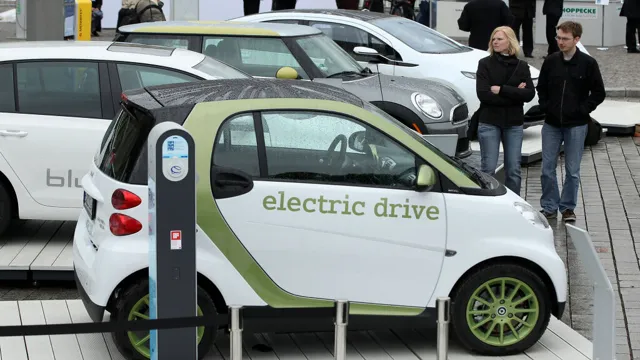
1890s-1920s: Rise and Disappearance
The early 1890s saw the rise of electric cars, as pioneering inventors and entrepreneurs saw the potential of using electricity as a means of transport. Although the first electric cars were slow and low-powered, they were seen as a cleaner and more efficient alternative to petrol-fueled vehicles. By the early 1900s, electric cars had gained popularity, particularly among urban dwellers who saw the benefits of using them for short trips.
However, the emergence of powerful petrol engines and decreasing prices led to a decline in the popularity of electric cars by the 1920s. Despite this, there were still pockets of electric car enthusiasts who continued to push for their use, particularly in the realm of public transportation. Today, the concept of electric cars has come full circle, with renewed interest in clean energy vehicles and the development of new technologies that have made electric cars more efficient, more powerful, and more widely available.
Modern Day Electric Cars
When we think about electrical cars, the first thing that may come to our minds is Tesla, but the history of electric vehicles is much longer. The roots of electric cars can be traced back to the early 1800s, where inventors like Robert Anderson and Thomas Davenport were developing rudimentary electric-powered vehicles. However, it was not until the late 1800s that electric cars started to become more commercially available in the United States.
At that time, electric cars were competing with the gasoline-powered cars and steam-powered cars. In the early 1900s, electric cars even outsold gasoline-powered cars in some cities. However, the lack of infrastructure and improvements in gasoline-powered cars made electric cars an unpopular option in the long run.
It was not until the technology advancements of the 21st century that electric vehicles regained their popularity. With the concerns about climate change and environmental impact, electric cars have become a more viable option than ever before. Today, many major car manufacturers such as BMW, Nissan, and Chevrolet have electric models available and Tesla remains one of the top players in the market.
1990s-2000s: Rebirth of Electric Cars
The 1990s saw a new chapter in the electric car revolution, with the introduction of modern-day electric cars. These cars were designed to address the drawbacks of their predecessors by incorporating advanced technology, better batteries, and improved charging infrastructure. This led to the emergence of electric cars that were not just environmentally friendly but could also compete with conventional vehicles in terms of performance, range, and affordability.
Today, electric cars have become much more common, and major car manufacturers have invested heavily in making electric cars that are practical and easy to own. With features such as regenerative braking and fast charging, electric cars have become more convenient and reliable than ever before. They are also gaining popularity amongst consumers as they offer a smoother and quieter ride, saving money on fuel, and have a lower impact on the environment.
As the world shifts towards more sustainable modes of transportation, electric cars are emerging as a viable alternative that can help reduce pollution and keep our planet green.
2010s-Present: Mainstreaming of Electric Cars
The modern-day electric cars are considered a significant breakthrough in the automotive industry, allowing for environmentally friendly vehicles and lower operating costs. With the advancement of technology, electric cars are becoming more and more feasible for the average consumer. The launch of Tesla’s Model S in 2012 was a significant milestone for electric cars, setting the bar high for others in the market.
Since then, many major car manufacturers like Nissan, BMW, and Volkswagen have developed electric models, making it more convenient for customers to integrate this sustainable mode of transportation into their lifestyle. This shift towards electric cars has been prompted by a global push towards reducing carbon emissions to combat climate change, resulting in incentives and regulations that encourage their use. However, with the higher cost compared to gasoline-powered vehicles, the adoption of electric cars has been gradual.
Despite their limited range and charging infrastructure, electric cars have become increasingly popular among drivers, who appreciate the lower maintenance costs and the quiet, smooth ride. As technology continues to develop and battery costs decrease, it is expected that electric cars will continue to gain popularity in the coming years.
Electric Cars Today: Stats and Trends
Electric Cars Today: Stats and Trends Electric cars, or EVs, are becoming increasingly popular today, as they offer a sustainable and eco-friendly mode of transportation. In fact, according to recent statistics, global EV sales reached a record high of 2 million in 2020.
This number is expected to continue to grow, as more and more people consider the benefits of electric cars, such as lower costs and reduced environmental impact. Governments across the world are also promoting the adoption of EVs, offering incentives and subsidies to encourage consumers to make the switch. With technological advancements, electric cars today are becoming more affordable, with longer battery life and faster charging times.
In short, electric cars are no longer just a futuristic concept, but an accessible and practical means of transportation for the modern-day driver.
Future of Electric Cars
The history of electrical cars dates back to the mid-19th century, when the first electric vehicle was developed by Thomas Davenport. However, it wasn’t until the 20th century that electric cars started to gain popularity with the invention of lead-acid batteries. General Motors released the EV1 in 1996, which was the first mass-produced electric car.
However, the production was short-lived due to the lack of infrastructure, range anxiety and low market demand. Today, advances in technology have made electric cars more practical for everyday use. The future of electric cars looks promising with the increasing demand for eco-friendly and sustainable transportation options.
Major car manufacturers such as Tesla, BMW, and Ford have invested heavily in the development of electric vehicles, with plans to produce more electric models in the coming years. With more charging stations being built and battery technology continually improving, electric cars are becoming increasingly practical and affordable for motorists. The history of electric cars has come full circle, and they are now poised to revolutionize the entire auto industry.
Electric Cars in the Next Decade
As we move into the next decade, electric cars are set to become more and more popular. This is due to a number of factors, including greater affordability and improved technology. With major manufacturers such as Tesla, Nissan, and Chevrolet all developing electric cars, there is likely to be a wider range of options available to drivers in the coming years.
Additionally, there is a growing awareness of the importance of reducing carbon emissions, and electric cars offer a way to do this while still enjoying the benefits of driving. So whether you’re a city dweller looking for a more sustainable way to get around or a long-distance driver looking for an alternative to traditional fossil fuels, an electric car may be the perfect choice for you.
Biggest Challenges Ahead for Electric Cars
As electric cars continue to grow in popularity, there are still many challenges ahead for the industry. One of the biggest challenges is the limited range of electric vehicles compared to traditional gasoline-powered cars. Drivers can quickly fill up their gas tanks and go for hundreds of miles, but electric cars require more planning and charging infrastructure.
Another challenge is the high cost of electric cars, which can be a barrier for many consumers. However, as technology improves and more affordable options become available, this may change. Infrastructure for electric vehicles, such as charging stations, will also need to be drastically expanded to support the growth of the industry.
Additionally, there are concerns about the environmental impact of electric cars, particularly the production and disposal of batteries. Despite these challenges, the future of electric cars looks bright as the industry continues to innovate and address these issues.
Conclusion
In conclusion, the history of electric cars may have started with fits and starts, but it’s certainly gaining traction now. From the earliest experiments with battery-powered vehicles in the 19th century to the sleek and stylish models hitting the market today, the industry has come a long way. As we strive toward a more sustainable future, electric cars will undoubtedly play a key role in reducing our carbon footprint and protecting the planet.
So buckle up, charge your batteries, and get ready for the ride of your life – because electric cars are here to stay!”
FAQs
What is the history of electric cars?
The history of electric cars dates back to the mid-19th century, with the development of battery-powered vehicles. However, the rise of gasoline-powered vehicles in the early 20th century led to a decline in electric car production until the 1990s, when interest in electric cars began to surge once again.
Who invented the first electric car?
The first electric car was invented by a Scottish inventor named Robert Anderson in 1832. However, it was not until the late 1800s and early 1900s that electric cars became more practical and widely used.
What impact did electric cars have on the automotive industry during the early 1900s?
Electric cars were quite popular during the early 1900s, accounting for about one third of all automobiles on the road in the United States. However, they were eventually overshadowed by the rise of gasoline-powered cars, which were more powerful and had a longer range.
How has the development of electric cars progressed in recent years?
In recent years, electric cars have become much more advanced, with better battery technology and longer driving ranges. Many major car manufacturers have also started producing electric cars, and governments around the world have promoted their use through financial incentives and infrastructure development.
